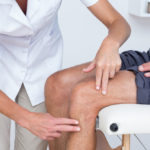SIGNS AND SYMPTOMS
The Mayo Clinic staff (2016) states, the signs and symptoms of a concussion can be subtle and may not be immediately apparent. Symptoms can last for days, weeks, or even longer.
One very serious concern that people often miss about concussions is that the onset of symptoms may be delayed by hours or days after the initial injury.
People may experience the following symptoms with a delayed onset (Mayo Clinic, 2016):
- Concentration and memory complaints
- Irritability and other personality changes
- Sensitivity to light and noise
- Sleep disturbances
- Psychological adjustment issues and depression
- Taste and smell disorders
CHILDREN AND CONCUSSIONS
More research has been done on children and concussions since concussions with children are commonplace. As I have stated earlier, they should be treated within the appropriate time frames. It is sometimes difficult to diagnose a young child with a concussion, but you can look for these symptoms:
- Listlessness, tiring easily
- Irritability, crankiness
- Change in eating or sleeping patterns
- Lack of interest in favorite toys
- Loss of balance, unsteady walking
The American Academy of Pediatrics (2016) recommends that you call your child’s doctor for advice if your child receives anything more than a light bump on the head. If your child remains alert, moves normally, and responds to you, the injury is probably minimal and usually doesn’t need further testing. In this case, if your child wants to nap, it’s OK to let them sleep.
If worrisome signs develop later, seek emergency care. I would take this one step further because even a mild concussion should be evaluated for further treatment. Injuries in young athletes can be cumulative if not treated promptly, or if they return to play too early.
The Mayo Clinic (2016) recommends, and I agree, seeking immediate medical attention if you or someone you are caring for has a head injury and begins experiencing the following symptoms:
- Vomiting
- Headache that worsens over time
- Changes in his or her behavior, including irritability or fussiness
- Changes in physical coordination, including stumbling or clumsiness
- Confusion or disorientation
- Slurred speech or other changes in speech
- Vision or eye disturbances, including pupils that are bigger than normal (dilated pupils) or pupils of varying sizes
- Changes in breathing pattern
- Lasting or recurrent dizziness
- Blood or fluid discharge from the nose or ears
- Large head bumps or bruises on areas other than the forehead, especially in infants under 12 months of age
In any case, the concussion needs more than just a brief evaluation; the patient should be treated for the whole brain and not just for cognitive function. If other areas are damaged they must get the help, and the rest they need.
Reference: http://www.mayoclinic.org/diseases-conditions/concussion/basics/symptoms/con-20019272 (2016).







Join the conversation